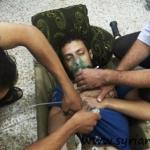Syrische Delegation nach ungeplantem Stopp unterwegs nach Genf
21. Jänner 2014, 16:29
 vergrößern 800x608foto: ap/emmanuel dunandUN-Generalsekretär Ban Ki-moon hat den Iran wieder von den Friedensgesprächen zu Syrien ausgeladen.
vergrößern 800x608foto: ap/emmanuel dunandUN-Generalsekretär Ban Ki-moon hat den Iran wieder von den Friedensgesprächen zu Syrien ausgeladen. foto: reuters/eric thayerHassan Rohani mit Ban Ki-moon.
foto: reuters/eric thayerHassan Rohani mit Ban Ki-moon.
Betankung wegen EU-Embargos verweigert - Iran ausgeladen - Opposition drohte zuvor mit Boykott des Treffens
Damaskus/Washington/Athen - Die syrische Regierungsdelegation für die Friedenskonferenz in Montreux ist nach einem fünfstündigen Zwischenaufenthalt auf dem Athener Flughafen am Dienstag in Richtung Schweiz gestartet. In dem Ort am Genfer See soll am Mittwoch die internationale Syrien-Konferenz beginnen.
Zuvor hatte es von syrischer Seite geheißen, die griechischen Behörden hätten sich geweigert, das Delegationsflugzeug zu betanken. Dagegen hatte ein Sprecher der griechischen Zivilluftfahrt in Athen gesagt, das Flugzeug werde überprüft, außerdem sei kein Flugplan unterbreitet worden.
Die griechische Firma, die für die Treibstoffversorgung zuständig ist, habe das Auftanken unter Verweis auf ein geltendes Handelsembargo der EU verweigert, gab Vassilis Alevizopoulos von der Gewerkschaft der Flughafenarbeiter bekannt.
Iran ausgeladen
Die zweite Syrien-Friedenskonferenz wird ohne Iran beginnen. Nach heftiger Kritik lud UNO-Generalsekretär Ban Ki-moon den Iran von den am Mittwoch beginnenden Gesprächen aus. Die syrische Opposition sagte daraufhin ihre Teilnahme zu. Für den russischen Außenminister Sergej Lawrow ist die Ausladung ein "Fehler".
Zuvor hatte die Opposition angekündigt, sie werde nicht an der Konferenz teilnehmen, sollte Ban die Einladung an Teheran nicht zurücknehmen. Kurz nachdem die syrische Nationalallianz ihr Kommen zur Konferenz zugesagt hatte, erklärte die größte Gruppe innerhalb der Exilopposition, der syrische Nationalrat, am späten Montagabend, sie werde aus der Koalition ausscheiden. Der Chef des syrischen Nationalrates, George Sabra, wurde von arabischen Medien mit den Worten zitiert: "Wir haben es schon vorher gesagt, wenn die Koalition an Genf II teilnimmt, werden wir nicht in der Gruppe bleiben."
USA begrüßen Entscheidung der UNO
Die USA begrüßten die Entscheidung Bans. Die Sprecherin des US-Außenministeriums, Jen Psaki, erklärte, alle Parteien könnten sich jetzt auf die Arbeit konzentrieren, die darin bestehe, das Leiden des syrischen Volkes zu beenden und den lange überfälligen Prozess eines politischen Übergangs zu beginnen.
Ban sei "zutiefst enttäuscht", dass der Iran sich entgegen vorherigen Zusagen am Montag nicht offiziell zu den Grundlagen und Zielen der Konferenz bekannt habe. "Angesichts der Tatsache, dass der Iran sich entschieden hat, außerhalb der grundlegenden Vereinbarungen zu bleiben, hat Ban entschieden, dass das eintägige Treffen in Montreux ohne die Teilnahme Irans abgehalten wird."
Die am Sonntag kurzfristig ausgesprochene Einladung für den Iran hatte zuvor für heftige Kritik gesorgt und die internationale Friedenskonferenz sogar ganz infrage gestellt. Die syrische Opposition hatte die Einladung partout nicht akzeptieren wollen. Auch in Washington hatte nach einem Bericht der "New York Times" die Erwartung geherrscht, dass der Iran wieder ausgeladen werde. Teheran ist einer der letzten engen Verbündeten des Regimes des syrischen Präsidenten.
USA: Keine Mindestgrundlage für Teilnahme gegeben
Washington kritisierte, dass der Iran die Genfer Vereinbarungen zu Syrien "nicht öffentlich und voll unterstützt" habe. Entsprechend zitierte die "New York Times" am Montag einen Vertreter des US-Außenministeriums. "Der Iran hat noch nicht seine Bereitschaft gezeigt, sich ausdrücklich und öffentlich der vollen Umsetzung des Genf-I-Dokuments zu verschreiben, das eine Mindestgrundlage für die Teilnahme am Friedensprozess ist", sagte die US-Botschafterin bei den Vereinten Nationen, Samantha Power, am Montagmorgen (Ortszeit) im Sicherheitsrat.
Das Genf-I-Dokument vom Juni 2012 ist die Grundlage der Friedensgespräche, die am Mittwoch in Montreux beginnen und dann in Genf fortgesetzt werden sollen. Es sieht einen Waffenstillstand, die Freilassung von politischen Häftlingen und die Bildung einer Übergangsregierung unter Beteiligung der Opposition vor.
Die Beteiligung des Iran an den Verhandlungen war seit Wochen ein Streitpunkt zwischen den Unterstützern des Assad-Regimes und seinen Gegnern.
Kritik aus Moskau, Enttäuschung in Teheran
Russlands Außenminister Lawrow hat die Ausladung des Iran als "Fehler" kritisiert. "Es ist aber keine Katastrophe", sagte Lawrow am Dienstag in Moskau vor Journalisten. "Ich bedauere, dass diese ganze Geschichte nicht zur Autorität der Organisation der Vereinten Nationen beiträgt", sagte Lawrow. Gegen die iranische Teilnahme an der Konferenz hätten sich die Teile der Opposition gewehrt, die einen Regimewechsel in Syrien anstreben, sagte Lawrow. Die russisch-amerikanische Initiative zur Lösung des Konflikts in Syrien sehe aber keine vorherigen Vereinbarungen oder Bedingungen vor. "Iran sollte eine wichtige Rolle spielen", sagte Lawrow.
Die Führung in Teheran hat enttäuscht auf die Entscheidung von Ban Ki-moon reagiert. "Die Ausladung erfolgte wohl unter politischem Druck und war daher ein sehr bedauerlicher und enttäuschender Schritt", sagte Außenamtssprecherin Marsieh Afcham am Dienstag. Der Iran habe sich nie aufgedrängt, stets einen klaren Standpunkt vertreten und zu keiner Zeit irgendwelche Vorbedingungen akzeptiert. Daher seien auch die Gründe für die Ausladung definitiv andere als die vom Generalsekretär erwähnten, so die Sprecherin auf einer Pressekonferenz. (APA, 21.1.2014)
Der Standard


